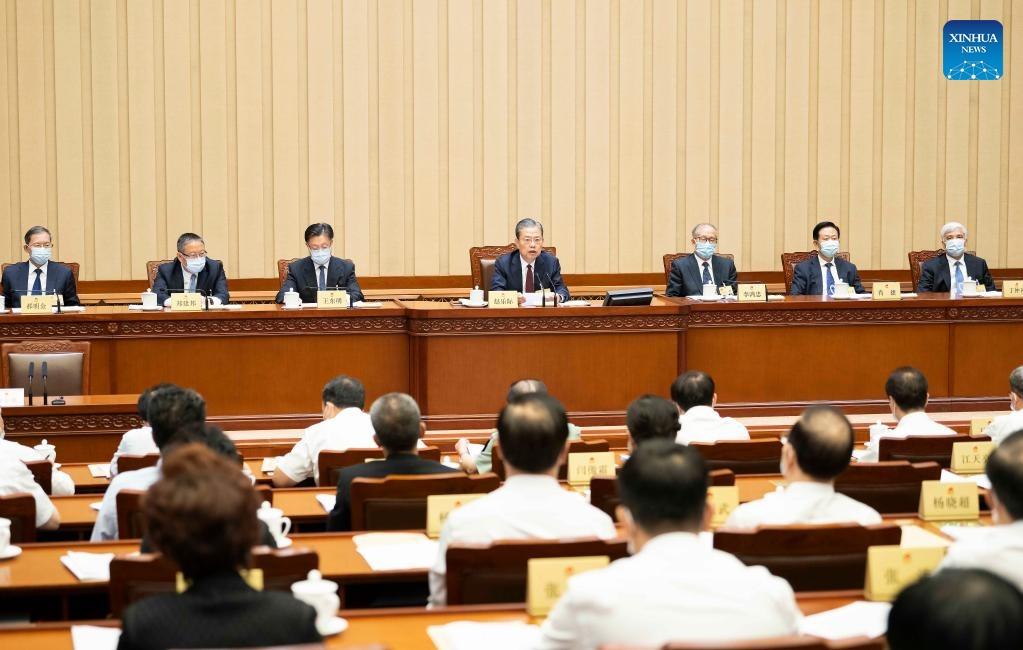 In this June 28, 2023 photo, Zhao Leji, chairman of the National People's Congress (NPC) Standing Committee, presides over the closing meeting of the third session of the 14th NPC Standing Committee at the Great Hall of the People in Beijing, China. (PHOTO / XINHUA)
In this June 28, 2023 photo, Zhao Leji, chairman of the National People's Congress (NPC) Standing Committee, presides over the closing meeting of the third session of the 14th NPC Standing Committee at the Great Hall of the People in Beijing, China. (PHOTO / XINHUA)
BEIJING – The Standing Committee of the 14th National People's Congress (NPC), China's top legislature, started its sixth session on Friday to review multiple draft laws and law revisions.
The Chinese lawmakers began deliberating a draft revision to the Law on Protection of Cultural Relics in order to further improve the management system regarding cultural relics protection and promote the appropriate utilization of cultural relics.
The session's agenda includes reviewing draft revisions to the Marine Environment Protection Law and the Charity Law, a draft law on patriotic education, and a draft law on food security
The draft revision to the law was submitted to an ongoing session of the NPC Standing Committee for its first reading.
The session's agenda includes reviewing draft revisions to the Marine Environment Protection Law and the Charity Law, a draft law on patriotic education, and a draft law on food security.
Lawmakers will also review bills on draft revisions to the State Council Organic Law, and the Law on the Prevention and Control of Infectious Diseases.
State Council
The draft revisionon the State Council Organic Law was tabled Friday before lawmakers for deliberation at the ongoing session. This is the first draft revision in over 40 years since the passing of the current law in December 1982.
The 18-article draft law revision mainly refines stipulations concerning regulations on the members of the State Council, the system of conference of the State Council, and regulations on State Council organs and their functions and powers, among others.
Revising the law is important to comprehensively building a law-based government, deepening reform of the Party and state institutions, and modernizing China's system and capacity for governance.
Preventing infectious diseases
On modifying the infectious disease monitoring system, the draft specifies measures such as establishing monitoring stations and enhancing coordination between prevention and medical treatment.
Regarding the reporting mechanism, the draft clarifies the time limit and methods for reporting an epidemic, and bans any action that interferes with epidemic reporting. The draft also makes stipulations on improving the epidemic emergency response system.
Charity law
Lawmakers are also considering improvements to its public fundraising system through an amendment to the Charity Law. A draft amendment was presented Friday to lawmakers for its second reading.
According to the draft, a charity organization could apply for its public fundraising qualification one year after its registration with relevant authorities according to the law, compared with two years stipulated in the previous draft.
The new draft specifies that the civil- affairs-related department of the State Council shall designate online public fundraising platforms for charity organizations and provide them with services in this regard.
Charity organizations shall make public comprehensive and detailed information about a fundraising activity or a charity project within three months after the conclusion of the event, the draft says.
A charity organization will be fined and have its public fundraising license revoked if it severely violates the law in carrying out a public fundraising event, the draft adds.
READ MORE: Draft takes aim at water pollution
The Standing Committee session is also expected to review a bill on a draft tariff law and a bill on a treaty on the transfer of sentenced persons between China and Colombia.
Documents to be submitted at the session also include a report on financial work, a report on the management of state-owned assets, as well as personnel appointments and removals, among other reports and bills.



